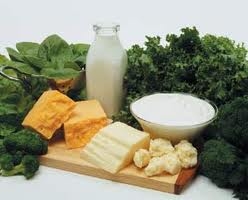Build a strong structure
When it comes to building strong bones, there are two key nutrients: calcium and vitamin D. Calcium supports your bones and teeth structure, while vitamin D improves calcium absorption and bone growth.
These nutrients are important early in life, but they may also help as you age. If you develop osteoporosis, a disease characterized by brittle and breaking bones, getting plenty of calcium and vitamin D may slow the disease and prevent fractures.
Understanding Bone Health
Your bones may seem rock-solid, but they could be at risk for a condition called osteoporosis, which can make them brittle, weak, and prone to breaks. The good news is that proper nutrition and exercise will help keep your bones strong for life.
Calcium is essential in building strong teeth and bones, and it may even keep you thin. Get your daily dose with these 10 figure-friendly meals that pack plenty of calcium.
Adults up to age 50 should get 1,000 milligrams of calcium and 200 international units (IUs) of vitamin D a day. Adults over 50 should get 1,200 milligrams of calcium and 400 to 600 IU of vitamin D.
Get these nutrients by trying these foods for healthy bones:
Cheese
Just because cheese is full of calcium doesn’t mean you need to eat it in excess (packing on the pounds won’t help your joints!). Just 1.5 ounces (think a set of dice) of cheddar cheese contains more than 30% of your daily value of calcium, so enjoy in moderation.
Most cheeses contain a small amount of vitamin D, but not enough to put a large dent in your daily needs.
Milk
There’s a reason milk is the poster child for calcium. Eight ounces of fat-free milk will cost you 90 calories, but provide you with 30% of your daily dose of calcium. Choose a brand fortified with vitamin D to get double the benefits.
Can’t get three glasses a day? Try blending milk into a smoothie or sauce.
Eggs
Though eggs only contain 6% of your daily vitamin D, they’re a quick and easy way to get it. Just don’t opt for egg whites—they may cut calories, but the vitamin D is in the yolk.
Yogurt
Most people get their vitamin D through exposure to sunlight, but certain foods, like yogurt, are fortified with vitamin D.
One cup of yogurt can be a creamy way to get your daily calcium. Stony field Farms makes a fat-free plain yogurt that contains 30% of your calcium and 20% of your vitamin D for the day.
And though we love the protein-packed Greek yogurts, these varieties tend to contain less calcium and little, if any, vitamin D.
Tuna
Tuna, another fatty fish, is a good source of vitamin D. Three ounces of canned tuna contains 154 IU, or about 39% of your daily dose of the sunshine vitamin. Try these low-cal Tuna-Melt Tacos as a way to sneak in vitamin D and calcium.
Sardines
These tiny fish, often found in cans, have surprisingly high levels of both vitamin D and calcium. Though they may look a bit odd, they have a savory taste that can be delicious in pastas and salads.
Spinach
Don’t eat dairy products? Spinach will be your new favorite way to get calcium. One cup of cooked spinach contains almost 25% of your daily calcium, plus fiber, iron, and vitamin A.
Salmon
Salmon is known for having plenty of heart-healthy omega-3 fatty acids, but a 3-ounce piece of sockeye salmon contains more than 100% of your vitamin D. So eat up for your heart and your bones.
Orange juice
A glass of fresh-squeezed OJ doesn’t have calcium or vitamin D, but it’s often fortified to contain these nutrients. Try Tropicana’s Calcium + Vitamin D to get a boost of these essentials.
Also, studies have shown that the ascorbic acid in OJ may help with calcium absorption, so you may be more likely to get the benefits of this fortified drink.
Fortified cereal
Certain cereals – like Kashi U Black Currants and Walnuts, Total Whole Grain, and Wheaties – contain up to 25% of your daily vitamin D. When you don’t have time to cook salmon or get out in the sun, cereals can be a tasty way to get your vitamin D.
Collard greens
Like spinach, this leafy green often enjoyed south of the Mason-Dixon Line is full of calcium. One cup of cooked collards contains more than 25% of your daily calcium. Plus you can easily sneak it into your favorite foods, like this über-healthy frittata.
Compiled by: R. Sawas

